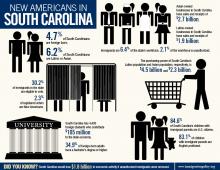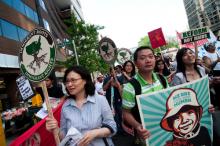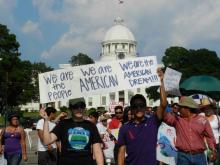Immigration

Bralyan loves bugs.
I met him during the first week of school as I conducted the standard assessment of how many words he could read per minute from a second-grade story. After the assessment, I gave him the customary caterpillar sticker to put on his shirt to show everyone that he was going to emerge as a great reader during his second-grade year.
You would have thought that I had given him a piece of gold.
"Oooh, I love bugs," he marveled as I handed him the sticker. "I have seen caterpillars around the trees at my apartment. They spin a chrysalis and turn into butterflies.
“Have you seen a roly poly bug?,” he continued. “They're my favorites!"
And so a friendship began around the pyrrharctia isabella, the armadillidum vulgar and other bugs that make up the most diverse group of animals on the planet.
This interaction told me some crucial things about Bralyan. It told me he is a smart kid, and it also told me that keeping him engaged in school would likely include bugs.
I later learned that Bralyan and his family moved here from Mexico when he was a baby. His mom and dad speak only Spanish at home. He speaks English at school.

THIS SUMMER, in a historic development, nearly 150 evangelical leaders signed an “Evangelical Statement of Principles for Immigration Reform.” Signers came from across the spectrum of evangelicalism, from leading Latino evangelical organizations to pastors Max Lucado, Bill Hybels, Joel Hunter, and Jim Daly, president of Focus on the Family.
No, that isn’t a typo. Sojourners stood side by side with Focus on the Family to draw attention to the plight of millions who have been caught up in a broken system. It was exciting to see a unity across the traditional political spectrum that rarely happens in Washington.
Make no mistake: There are still big gaps in theology and politics among those in the group. But rather than politics, we focused on the things we agreed were fundamental moral issues and biblical imperatives. Instead of ideology, we came together because of morality and common sense.
Big things don’t change in Washington first; they change in the nation’s capital last. You’d think that with all the lobbyists on K Street and the billions of dollars being spent, Washington must be the country’s most important place. But this is the place where things don’t change, where politics maintains the status quo and the special interests maintain their own interests. Both Republicans and Democrats are more concerned with their political bases and getting re-elected than with the people and families whose lives are being crushed.

Nikki Haley, the governor of my state, recently signed the South Carolina Illegal Immigration and Reform Act. The law, which is part of a recent wave of state immigration legislation, goes into effect in January. As she signed the bill, she stated:
“What I’m concerned about is the money we’re losing because of illegal immigration in this state. The money that’s lost in education and medical services and workers and employment and all of those things is well beyond millions of dollars …”
It is dehumanizing when you refer to people only in terms of money. Further, the research does not support the governor’s statement.
According to the Institute for Taxation and Economic Policy, undocumented workers in South Carolina paid $43.6 million in state and local taxes in 2010. Another study outlined the losses to the state if all unauthorized immigrants were removed from South Carolina. The state would lose $1.8 billion in economic activity, $782.9 million in gross state product and approximately 12,059 jobs.
Whether encouraging children to succeed, caring for elders at the end of life, or investing in struggling communities, strong families can make all the difference. Unfortunately, our broken immigration system often negatively affects families, increasing both their emotional stress and financial burden. Too often our laws actually separate family members from each other in ways that create lasting damage.
Recently, the federal government announced a policy change designed to keep families together as they navigate the process of applying for green cards. While this shift will also streamline the process and reduce the complexity of application, the new rules can still be confusing to those seeking help. That is why the Interfaith Immigration Coalition is working to educate the faith community about these developments. On September 10, the Coalition will host a webinar from 4-5 p.m. EDT for faith leaders interested in learning more. Take this opportunity to hear from policy experts, legal advocates, and faith leaders about this important topic.
When: Monday, September 10th from 4- 5 p.m. EDT
Where: Phone
RSVP here.

I love to receive letters. When I was a little boy, I lived on a long, straight street and I could see the mail truck coming from a long way off. After the mailman stopped in front of our house, I ran with hope in my heart down our front walkway, between our two giant maple trees and across the street to our mailbox. Would there be a letter for me? Was someone in the world thinking of me?
One day last year it was not the mailman, but a second-grader on the school playground, who handed a letter to me. I unfolded it.
"Dear Mr. Barton, hi it Odeth from 2th grade I miss you a lot I wanted to know about you so much I am being good I am in 4th grade Do you miss me. I live in __________ I go to school in __________ I hope you will come to my school … can you come visit me in school ask for my name…I am 10 year old I want you to come to my school.
Your best student,
Odeth"
What a wonderful thing, to be remembered by a student.

If you blink, you might miss the fact that the religious luminaries offering prayers at the Republican National Convention agree on a surprising topic: the need to welcome immigrants and pass immigration reform.
The views of these religious leaders differ sharply from the Republicans’ own platform. Guided by the likes of Kansas Secretary of State Kris Kobach, the brains behind state-level anti-immigrant laws, the GOP draft platform takes a hardline stance on immigration.
But the Episcopal, evangelical Protestant, Greek Orthodox and Catholic leaders chosen to lead the RNC in prayer beg to differ.

Today, two Christian leaders in Arizona delivered a petition signed by thousands of Christians to Gov. Jan Brewer calling on her to retract her controversial executive order denying driver’s licenses and other benefits to undocumented young people who qualify for deferred action. The petition was signed by members of the Sojourners community and reads:
We believe every person, regardless of immigration status, is created in God's image. Your recent executive order denying driver's licenses and other benefits to undocumented young people who qualify for deferred action is harsh and short-sighted. As people of faith, we urge you to reconsider your position and retract this executive order so that all God's children in Arizona can contribute to your state's economy and strengthen its communities.
Pastor Yvette Lopez of the New Life Church of God in Tucson, Ariz., also helped deliver the petition.
“I’m a conservative, but this is this was the last straw for me,” Lopez said.“This executive order is deplorable, and it must be rescinded; my faith and my politics demand this.”

President Barack Obama recently announced a policy change that would let young people living in the U.S. without immigration status pursue an education and find meaningful work without fear of deportation. As communities continue to suffer the effects of the country’s broken immigration system and families live in fear of their loved ones being deported, this was news to celebrate and an answer to prayer.
Apparently Jan Brewer, the governor of Arizona, had a different reaction to the compassion and progress embodied by this new policy. On the day it went into effect, Brewer issued an executive order denying driver’s licenses to young people in Arizona qualifying for the relief being offered by the federal government.

There is a wonderful scene in Harper Lee's novel To Kill A Mockingbird where the all-white jury has returned an unjust verdict against Tom Robinson. Atticus Finch begins to wearily walk out of the courthouse. His children, Jem and Scout, are in the balcony with the black folks of the county. They all rise as Atticus walks out — except the children — so the Rev. Sykes says to Scout, “Miss Jean Louise, stand up. Your father’s passin’.”
During the first weeks of school, Scout's story came back to me as I was benchmarking the reading levels of our first- and second-grade students. Before I took the students through the benchmark test, I asked them open-ended questions and listened to their answers. At first they were shy, as children often are when they meet a new teacher. But soon they were telling me their stories with confident voices and dimpled smiles.
A recent study by The National Conference of State Legislatures shows that in 2012, states passed fewer immigration laws than previous years.
“U.S. state legislatures passed fewer immigration measures this year because lawmakers' priorities shifted to balancing budgets and U.S. courts were weighing how much authority states have to enforce immigration laws, according to a study released on Monday.”
Read full story HERE.
As reported by The Associated Press last week:
Locking up illegal immigrants has grown profoundly lucrative for the private prisons industry, a reliable pot of revenue that helped keep some of the biggest companies in business.
And while nearly half of the 400,000 immigrants held annually are housed in private facilities, the federal government — which spends $2 billion a year on keeping those people in custody — says it isn't necessarily cheaper to outsource the work, a central argument used for privatization in the first place.
The Associated Press, seeking to tally the scope of the private facilities, add up their cost and the amounts the companies spend on lobbying and campaign donations, reviewed more than 10 years' worth of federal and state records. It found a complex, mutually beneficial and evidently legal relationship between those who make corrections and immigration policy and a few prison companies. Some of those companies were struggling to survive before toughened immigrant detention laws took effect.
Read more here
Today, the Department of Homeland Security (DHS) provided additional information on Obama’s DREAMer relief process in preparation for the August 15 implementation through U.S. Citizenship and Immigration Services (USCIS) agency. Items discussed included:
- Requestors – those in removal proceedings, those with final orders, and those who have never been in removal proceedings – will be able to affirmatively request consideration of deferred action for childhood arrivals with USCIS.
- Requestors will use a form developed for this specific purpose.
- Requestors will mail their deferred action request together with an application for an employment authorization document and all applicable fees to the USCIS lockbox.
- All requestors must provide biometrics and undergo background checks.
- Fee waivers cannot be requested for the application for employment authorization and biometric collection. However, fee exemptions will be available in limited circumstances.
- The four USCIS Service Centers will review requests.
To read details on the Deferred Action for Childhood Arrivals Process (DREAMer relief) visit USCIS website HERE.
For a great account on what Obama's move means in real terms for DREAMers, read Mariella Saavedra's post HERE.

As many as 1.4 million undocumented immigrant youth — aka “DREAMers” — would qualify for temporary work permits and be shielded from deportation once President Obama's DREAMer relief goes into effect August 15.
I am one of these DREAMers.
I came to this country from Peru when I was five years old. While I miss my homeland, I’ve come also to appreciate and thrive in my new one.
I’ve volunteered in my community at museums, schools, and hospice centers. I’ve had the privilege also of attending one of the top private, liberal arts schools in the nation and now am continuing my education as a mental health counseling graduate student.
President Obama’s DREAMer relief finally will give DREAMers such as me a chance to fully engage in this country. I finally will be able to work and, like the rest of my peers, get to experience the joys and challenges of being gainfully employed.

Editor's Note: A recent news report recounted how activists with the National Immigrant Youth Alliance have placed themselves intentionally in deportation proceedings in order to enter the Broward Transitional Center, an immigration detention facility in Florida. They say they encountered scores of detainees who shouldn't be there under the Obama administration's revised deportation policies. What follows is a first-person account by one of the detainees, Marco Saavedra, a former intern at Sojourners.
I am glad the stories we are finding in this detention center are getting back to you all out there. My name is Marco Saavedra and recently I put myself into deportation proceedings hoping they'd bring me to the Broward Detention Center.
Despite being a DREAMer, the border patrol office I approached looking for a missing friend didn't think twice about detaining me. Little did they know they were doing exactly what we wanted, bringing us to this detention center filled with low-priority detainees.
No one deserves to be locked up like they are inside of this facility.

Can America still afford to be a generous immigrant nation? Can it afford not to be?
These are the questions posed by Nine Network of Public Media's and PBS's documentary Homeland: Immigration in America. The first of a three-part series focused on job issues.
While the largest Hispanic populations are in California and Texas, the fastest growing Hispanic populations are in smaller Southern and Midwestern towns.
The episode shined a spotlight on Monett, Mo., home to a Tyson Foods chicken processing plant; EFCO, a Pella Company; and Happy Apples — an apple orchard that produces caramel apples for nationwide sales. The plants have relied on immigrant labor for years, and now the city has revitalized because of the influx of Hispanic immigrants.
While the issue of illegal immigration is at the forefront of people's minds when discussing immigration reform as a whole, the documentary points out the flaws in the legal immigration process as it exists.

When I was a sophomore at Bethel University, I was the top 1,500-meter runner on my track team. Then, my junior year, a transfer student came, and she was really fast. She quickly took my place as the fastest miler on the team, winning multiple national championships in the process.
I’ll admit to having felt a little bit frustrated because she came in from the outside and passed me up. But training with her is one of the key reasons I was ultimately able to finish sixth at the national meet, good enough to earn All-American honors.
She pushed me to become better. She gave me someone to chase. She brought more attention to our school and our team, resulting in more fast recruits. In short, she made me and our whole team better.
As the London Olympics begin this week, the United States counts many “transfers” — immigrants from all over the world who are now U.S. citizens — among its top athletes. Some people may feel threatened by these immigrants because they are potentially taking the place of others who were born here.
But I think our immigrants make us better, just like my transfer teammate made me better. They continually push us to do better, work harder and find new ways to improve.

We lost a bitter legislative battle this year, as Alabama Legislators voted to make the nation's most toxic anti-immigrant law more poisonous than anyone imagined. Added to the notorious HB 56 is a requirement that the names and faces of undocumented persons be plastered on the web and in prominent public places — the new law stops just short of putting targets on their backs.
Teachers are still required to interrogate schoolchildren about their immigration status. People of faith, Good Samaritans, and family members are now felons if they knowingly drive five undocumented children to the store, the doctor, or Vacation Bible School. Racial profiling provisions make every trip to school, work, and church a nightmare.
The legislators — all Republicans — must have laughed all the way to golf games waiting for them back in their districts. They think they won.

When people who have immigrated to another country through methods other than the official legal system are discussed, we hear quite a few words bandied about: “illegal,” “undocumented,” and “alien” just to name a few. The terms are often used interchangeably, but are these terms interchangeable? On NPR’s, Tell Me More, Professor Kevin Johnson, Dean of the law school at the University of California at Davis says no.
“I fear that ‘illegal immigrant’—the term—is a loaded term. It is not as loaded as some of its predecessors like ‘illegal alien’ or ‘wetback,’ but it still is a loaded term,” says Johnson.
E-mails from former Sen. Russell Pearce purportedly reveal the motivations behind SB 1070, claims the ACLU:
"The American Civil Liberties Union of Arizona has released thousands of e-mails that it says proves Arizona's controversial immigration law was racially motivated.
The e-mails, acquired through a public records request to the state Legislature, are to and from former senator Russell Pearce, who authored Senate Bill 1070."
Read the full story HERE.

What would you do if you were offering a voluntary service, like medical or pastoral care to a vulnerable population, and the clients repeatedly spoke of abuses by a specific perpetrator? You would be a “mandated reporter,” which for the caring professions means you must report certain cases of abuse to authorities. But then you find out that federal employees—law enforcement, in fact—are committing the atrocities. How do you call the cops on the cops?
This was my dilemma as I started working on the Mexico-side of the Sonora-Arizona border washing blistered feet and bandaging wounds of migrants who were just repatriated back to Mexico.
We set up the Nogales Migrant Aid Station to provide basic care to upwards of 1,200 deported people each day. But we did not expect that human rights documentation would become the most pressing part of that work. With each Homeland Security busload of migrants being released from Border Patrol custody, we listened and then documented case after case of abuse.
The abuse involved cussing and yelling, being pushed into barbed wire fencing, sexual assault, denial of life-saving medical care, denial of adequate food and water to children and the list continues.